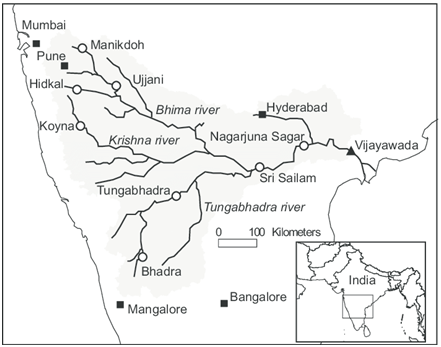Krishna Water Dispute
Maharashtra, Karnataka to jointly oppose A.P. plea on water-sharing formula
Issue
Context:
Maharashtra, Karnataka to jointly oppose A.P. plea on water-sharing formula
About Krishna Water Dispute:
- A dispute over the sharing of Krishna waters has been ongoing for many decades, beginning with the erstwhile Hyderabad and Mysore states, and later continuing between successors Maharashtra, Karnataka and Andhra Pradesh.
- In 1969, the Krishna Water Disputes Tribunal (KWDT) was set up under the Inter-State River Water Dispute Act, 1956, and presented its report in 1973.
- The Tribunal divided the 2060 TMC (thousand million cubic feet) of Krishna water at 75 per cent dependability into three parts: 560 TMC for Maharashtra, 700 TMC for Karnataka and 800 TMC for Andhra (facts not important)
- The second KWDT was instituted in 2004.
|
About Krishna River:
|
Constitutional Provisions Related to Inter-State River Water Dispute:
Article 262 of the Constitution:
- Parliament may by law provide for the adjudication of any dispute or complaint with respect to the use, distribution or control of the waters of, or in, any inter-State river or river valley.
- Parliament may, by law provide that neither the Supreme Court nor any other court shall exercise jurisdiction in respect of any such dispute or complaint as mentioned above.
Entry 56 of Union List: The regulation and development of inter-state rivers and river valleys to the extent declared by Parliament to be expedient in the public interest.
|
Inter-State River Water Disputes (Amendment) Bill, 2019
|
Causes of River Disputes:
- States have been fighting against each other for their 'rightful' share of water since the first reorganisation of States after Independence.
- Harnessing river water being a State subject, the riparian States are expected to solve issues among themselves. But the states are reluctant to share water with any other states.
- Many development projects have become a cause of dispute between states like the Polavaram project became the bone of contention between the Telugu-speaking States.
- Excessive release or blockage of water sometimes created a situation of flood/drought in other state. For ex.- Odisha has repeatedly claimed that Chhattisgarh either blocks or excessively releases water from its Kalma barrage without prior intimation.
Way Forward:
- Setting up a National Water Commission by subsuming Central Water Commission and Central Ground Board as recommended by Mihir Shah panel.
- Inter-State River Water disputes (Amendment) Bill, 2019 will help in faster adjudication of water disputes between the states.
- The National Water Policy must be followed for rational use of water and conservation of water sources must be followed by the states.
- Water disputes must be depoliticised and must not be made an emotional issue linked with regional pride.
|
Inter-State River Water Disputes Act, 1956
|






